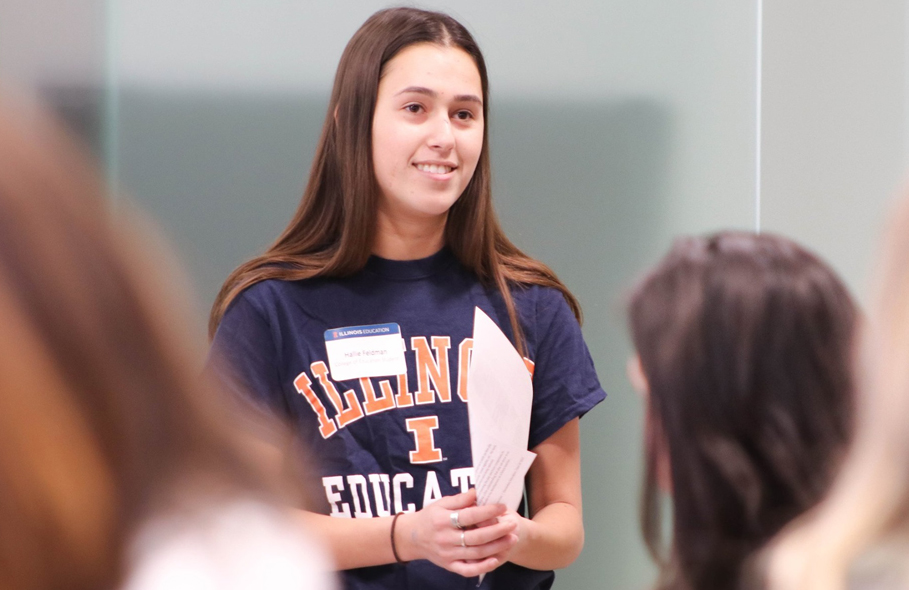James Scholar Honors Program Fostering Scholar-Citizens
by Tom Hanlon / Dec 7, 2020

The College of Education’s James Scholar Honors Program offers tremendous opportunities for students to grow as researchers, leaders, and professionals.
Each spring, select high school seniors who have been admitted to the University of Illinois’ College of Education are invited to attend a luncheon hosted by Education faculty, staff, and students to learn about the College’s James Scholar Program.
Each spring, most of those students leave the luncheon awed and excited.
“You can see it on their faces,” says Kathleen Ryan, assistant dean for academic affairs. “They’re not seeing these opportunities at other places.”
The excitement comes from the plethora of advantages the program offers to honors students. Chief among those advantages are the research opportunities they can take part in, beginning their first semester on campus. James Scholars complete a project each semester they are in the program, which typically is until they earn their undergraduate degree.
“Research is a cornerstone of our program, and we couldn’t do it without the faculty in our College,” Ryan says. “We have about 25 faculty who offer specific opportunities to James Scholars to participate in their research projects.”
The College has four areas of emphasis: research, service learning, leadership, and professional development. “We offer a variety of options for our students and really encourage them to both explore their interests and to branch out and try new things,” says Hannah Rogers, admissions and records officer. “Students can discuss project ideas with their professor in a course they’re enrolled in, and that will count as James Scholar credit. They then earn an honor grade in that course as long as they successfully complete the project.”
A few examples of James Scholar research projects include completing a literature review of Latinas who are breaking stereotypes in sports, providing educational programs for prison inmates, exploring state standards and requirements to build career skills, and undertaking various research projects in special education.
The College currently has 135 James Scholars (about 20 percent of its undergraduate enrollment), a campus-wide but unit-specific program named in honor of Edmund James, the fourth University of Illinois president. The program offers a rigorous but rewarding honors sequence for undergraduate students. For example, students are doing poster sessions their first semester and are encouraged to take part in a campus-wide undergraduate research symposium in the spring of their freshman year.
“It’s an amazing opportunity for learning and growth,” Ryan says. “And that’s all in the freshman year.”
Admission to the James Scholar program is by invitation only, based on high school achievements. Besides the opportunities to develop as a researcher, leader, and professional, James Scholars receive early registration privileges—a big deal, especially for underclassmen, Rogers says, “because when you’re a freshman, sometimes course availability can be limited by the time you’re able to register.”
Other benefits to the program, Rogers adds, include the potential for notation on their transcripts, stack passes to the main undergraduate library, and receiving cords to wear upon graduation. “It also gives them really great professional connections that they can refer back to once they’re in the field,” she says.
“Our James Scholars are not just getting the usual college experience,” Rogers says. “They’re going above and beyond that. They are exceptional students who have gone on to do some incredible things.” For example, she says, Jasmine Wong, a James Scholar who graduated in 2015, taught locally for five years and spent a few summers teaching English in Singapore and China. “She’s now teaching in the Chicago area after completing her master’s degree in Educational Policy, Organization and Leadership here at the College,” Rogers notes.
The College wants their students to leave as well-rounded people, able to make research-based decisions, Ryan says. And the James Scholar Honors Program helps them do just that. “When they leave here, they’re leaving as global citizens, ready to excel in the areas of equity and social change,” she says.